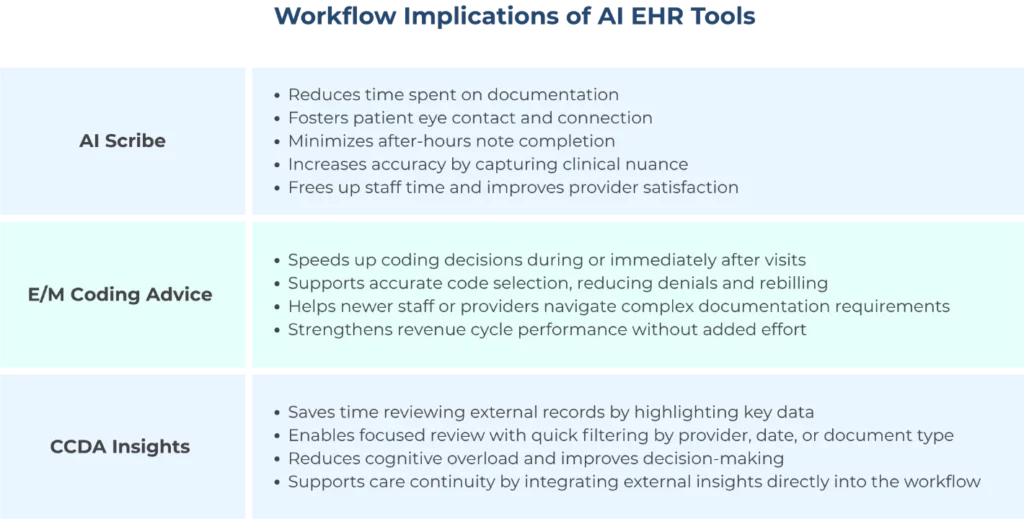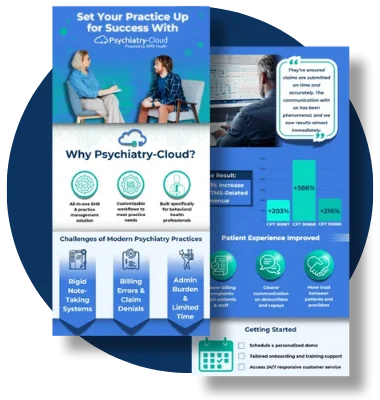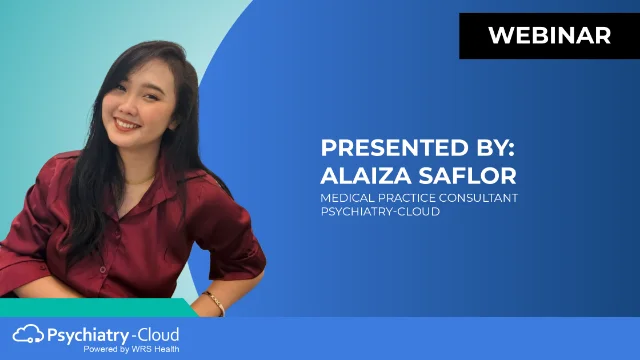Key Takeaways
- A mental health EHR with AI lightens the administrative load so clinicians can focus on patients.
- AI supports psychiatry-specific documentation and predictive care insights.
- Thoughtful use of mental health automation can improve documentation, compliance, and clinical insights.
- Find out how one practice reached 0% claim rejection rate.
Do you find yourself asking, “How can I spend less time on office work and more time on patient care?” If so, you’re not alone. Mental health providers face unique pressures, like long documentation hours, emotionally complex care, and heavy administrative demands.
While these responsibilities can chip away at clinical focus and team morale, turning to updated systems and practice management solutions can ease the burden. Adding AI or updating your current operating flow can feel risky—but done right, it’s one of the most powerful ways to reduce overwhelm and improve care delivery.
For psychiatrists looking to grow their practice, rebalance their time, or refine team workflows, exploring AI features within their EHR is an ideal place to start. A modern mental health platform with artificial intelligence can streamline documentation, automate repetitive tasks, and support providers with clinical insights that matter. For practice owners, clinicians, and administrators, it’s a tool that helps balance compassion and efficiency—without compromising either.
Below are five essential things to know about how AI is transforming psychiatric EHR systems today.
Table of Contents
AI in Psychiatry Eases Documentation Fatigue
Clinical notes in psychiatry are detailed, sensitive, and often narrative-driven. Often, that means longer hours typing assessments and documenting interventions after encounters. Completing therapy summaries, medication updates, and clinical notes often ends up happening well after clinic hours, blurring the boundaries between work and home life for practice owners.
AI in psychiatry offers relief. Natural language processing (NLP) tools can transcribe and organize spoken interactions into structured notes, automatically populate relevant fields, and suggest diagnostic codes in real time. Rather than starting from a blank screen, providers review and approve smart drafts tailored to each encounter. Plus, systems that are built to support psychiatry ensure accuracy and intuitive workflows.
Giving providers support to finish charts during clinic hours helps avoid evening burnout and gives clinicians back valuable patient time.
An Effective AI-Driven EHR Makes Onboarding Easier for New Staff
If you’re looking to ease the process of training a new team member, you can also lean on AI in psychiatry EHRs. Many mental health practices operate with lean teams, making efficient onboarding essential. A well-designed mental health EHR with AI offers new staff intuitive pathways to learn fast and feel confident.
AI-powered systems often include:
- Role-based dashboards that show only the tools each user needs.
- Templates customized for behavioral health workflows, such as DSM-5 criteria or progress note structures.
- Smart mental health automation for intake forms, scheduling, and billing codes.
When combined, these features reduce the learning curve and help new staff integrate smoothly—without burdening existing staff with hours of training time.

Automation Reduces Admin Overload
When you think of automation, what comes to mind? Maybe it’s a factory assembly line: efficient, repeatable, and reliable. When implemented intentionally, automating processes reduces burnout from repetitive tasks, speeds up workflows, and delivers more consistent results. The same applies to mental health automation. Incorporating AI features to automate routine tasks doesn’t mean replacing people—it means giving them the tools to do their jobs better. AI-enabled EHRs can handle appointment reminders, claims status checks, and routine follow-ups, all with minimal manual input.
Here’s what that might look like in action:
- Front office: Uses AI to answer questions and schedule sessions.
- Billing staff: Leverages automation to suggest codes and validate claims.
- Clinicians: Benefit from auto-filled notes and smart follow-up prompts.
These AI features free up staff time, reduce errors, and support a smoother patient experience—all without disrupting your existing workflows.
Looking to scale your practice? Explore insights from our practice growth webinar with Dr. Mitchell Cabisudo.
AI Tools Must Be Tailored to Mental Health Needs
Generic AI tools can create more frustration than relief if they’re not built for psychiatric care. Rather than navigate around tools and functions your specialty doesn’t require, choose a mental health-specific EHR with AI that works the way you work.
Look for an EHR platform that:
- Recognizes behavioral health language and charting styles.
- Supports therapy, psychiatry, and case management workflows.
- Offers real-world evidence of improved documentation and staff satisfaction.
- Includes privacy-focused features for sensitive mental health data.
When EHR systems align AI features with the realities of mental health work, it becomes a trusted partner to support your work rather than a technical distraction to worry about.
The Right EHR Partner Helps You Adapt with Confidence
It’s normal to be cautious about adopting AI in a clinical setting—especially when the stakes are high. A strong EHR partner helps guide the transition. From data migration and staff training to workflow setup and compliance planning, the right vendor becomes part of your team. They’ll help you choose the features that fit your practice today and scale with you as needs evolve.
Modernizing your system isn’t about adding every AI feature and hoping for the best. It’s about thoughtful, intentional change—with a vendor that cares about your outcomes as much as you do. Whether you’re transitioning from a legacy system or fine-tuning what you already have, the right mental health EHR partner ensures AI enhances your care—not complicates it.
Future-Proof Your Practice With the Right AI EHR











